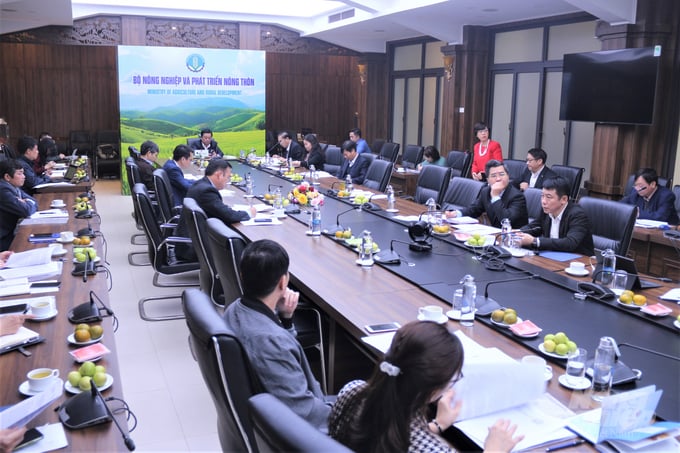
The Ministry of Agriculture and Rural Development held a meeting of the Executive Committee of the 2030 Agricultural Bioindustry Development Project. Photo: Pham Hieu.
DThe biotechnological level of Vietnam is on par with advanced countries
According to the Ministry of Science, Technology and Environment (Ministry of Agriculture and Rural Development), in the period 2006-2020, the Agricultural Biotechnology Program has researched and applied biotechnology in the selection and creation of agroforestry plant varieties, industry, livestock animal breeds, aquatic products , pesticides, organic fertilizers, animal feed…
The program has also carried out many micropropagation projects by tissue culture on forest trees, flowers, potatoes, etc.; has set up large-scale tissue culture processes, transferred to production facilities, and supplied millions of seedlings to many companies and farmers.
The program has developed many kinds of biological products, microbial fertilizers, preservative products for agricultural product processing, and environmental treatments. Many products have been scaled up through pilot production projects, some preparations have been registered for intellectual property protection and effectively moved into production.
The application of molecular marker technology has identified effective genetic resources for crossing and breeding cows, pigs and chickens; has applied reproductive technology in research to improve reproductive efficiency, milk yield in cows and pig semen preservation technology.
The program implements many tasks in the field of genetic engineering and creates products as a prerequisite for the manufacture of products with a high biotech content; isolates genes of commercial value, identifies genes for disease resistance and tolerance in plant and animal varieties through gene mapping for breeding work.
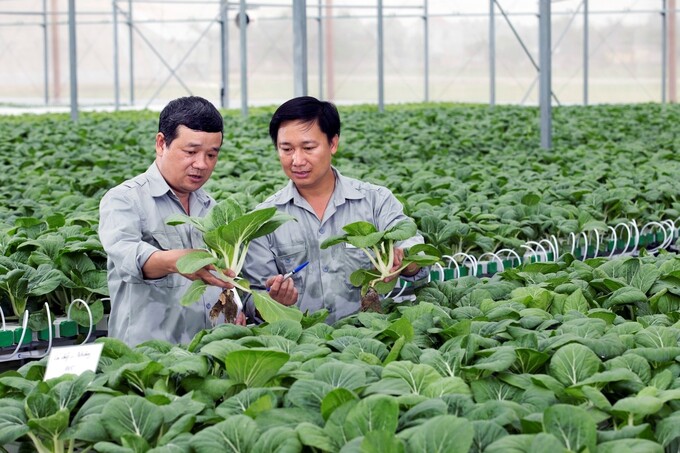
The Biotechnology in Agriculture program has researched and applied biotechnology in the selection and production of plant varieties, livestock breeds, aquatic products, etc. Photo: tsp.
Based on the results achieved, the Agrobioindustry Development Project by 2030 has set the overarching goal of developing a sustainable, eco-friendly, high value-added bioindustrial environment for agricultural economic development.
At the same time, improve the research, development, application and mastery of modern biotechnology in the region and the world; To transform Vietnam into a country with the same level of biotechnology as other advanced countries in the region in the world.
Since then, the project has also identified six main tasks. In particular, the development of science and technology at the service of the agricultural biological industry; Construction and development of the bio-industrial potential of the agricultural sector; Construction and development of a biological industry in the agricultural sector; Building and perfecting a system of legal documents, mechanisms and guidelines to promote the development of agricultural bio-industry; International cooperation in the field of agro-bioindustry; Communication to raise awareness of the agro-bioindustry.
In the coming period, the Ministry of Science, Technology and Environment will coordinate with ministries, sectors and municipalities to develop plans and implement the contents of the program such as science and technology development; Creation and development of the bio-industrial potential of the agricultural sector (increase in investments and training of human resources); International cooperation and political mechanisms.
At the same time, the department will submit the 2030 Agricultural Bioindustry Development Project Action Plan to the Ministry of Agriculture and Rural Development for approval. Pursue bio-industry research and development to serve the development goals of the country Agriculture and rural development, development of circular economy in agriculture.
At the same time, the department will integrate capacity building content (education and equipment investment) with public investment plans and postgraduate education abroad. Organization and implementation of information and communication work on the agrobioindustry.
Establish a mechanism to attract high-skilled human resources in the biological industry
According to Mr. Tran Nam Tu, deputy director of the Department of Science, Technology and Environment (Ministry of Education and Training), by the end of 2020 and early 2022, the Ministry of Education and Training will have a total of 31 technology education and training institutions nationwide with biology about 1,300 lecturers. In the professors and associate professors account for about 120 people, graduate students account for more than 620 people. In addition to biotechnology in general, the fields of biotechnology and agricultural bio-industry at educational institutions of the Ministry of Education and Training are also geared towards development.
Accordingly, Mr. Tran Nam Tu suggested that the education work of the Ministry of Agriculture and Rural Development should focus on the field of bio-industry in agriculture to improve efficiency, and not spread to all schools, but only to some Educational areas should focus institutions.
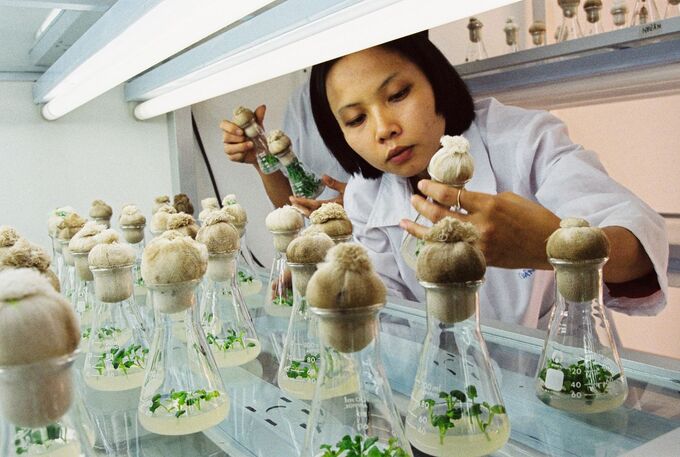
The agricultural sector needs to create a mechanism to attract highly qualified human resources to scientific research. Picture: tsp.
Mr. Nguyen Do Anh Tuan, Director of the Department of International Cooperation (Ministry of Agriculture and Rural Development) expressed the view: In order to promote the international cooperation element in the development of bio-industry in agriculture, it is necessary to set up a team of experts the field of agriculture and forestry Vietnamese families, including Vietnamese abroad to coordinate them, even have a mechanism to invite them to work.
“For large international research organizations, with which the Ministry of Agriculture and Rural Development has good relations, it is necessary to send Vietnamese people to participate in their research. At the same time, the Ministry of Agriculture and Rural Development must also coordinate with non-agricultural institutions to keep up with the global biotechnology trend,” suggested Mr. Nguyen Do Anh Tuan.
“The leading crane” in the country’s science and technology industry
According to Deputy Minister of Agriculture and Rural Development Phung Duc Tien, high-quality human resources for biological industry in agriculture are not high at present. In recent years, the number of experts who have disappeared has fallen significantly.
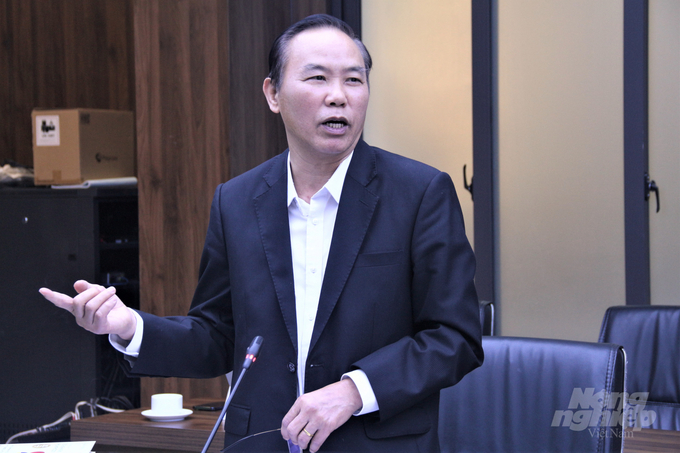
Vice Minister Phung Duc Tien stressed that science and technology will boost the position of the agricultural sector. Picture: Pham Hieu.
In addition, the Deputy Minister said that international cooperation is also an important factor for the bio-industry, since we can both train high-skilled human resources and benefit from and learn from the industrial technology of foreign companies. Therefore, the Deputy Minister stressed that international cooperation related to education must be selective, finding scientists who love and are passionate about the industry.
“Science and technology will advance the position of agriculture. If the potential of science and technology can be unleashed, the growth rate of the agricultural sector can increase tenfold. By removing obstacles from the mechanism, science and technology in agriculture will be the pioneer and become the “leading crane” in the country’s science and technology industry,” said Deputy Minister Phung Duc Tien.
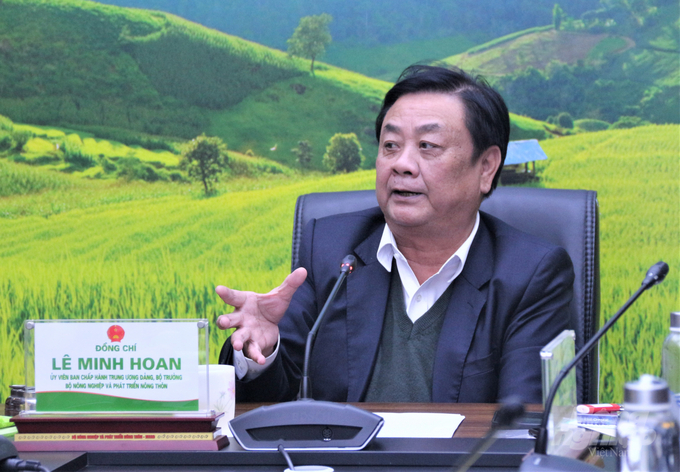
According to Minister Le Minh Hoan, science must aim to serve the lives of millions of Vietnamese farmers. Picture: Pham Hieu.
According to Agriculture and Rural Development Minister Le Minh Hoan, in the past many people thought that true art was not art for art’s sake, but art for man’s sake. The same is true today for science in the field of agriculture. In agriculture, science must aim to serve the lives of millions of Vietnamese farmers.
“There is still a lot of room for the development of science and technology in agriculture. We need an effective approach to linking the three actors state, science and business. There is such scientific research – a necessary condition, by companies – a sufficient condition to enter the market and serve effectively in production,” analyzed Minister Le Minh Hoan.
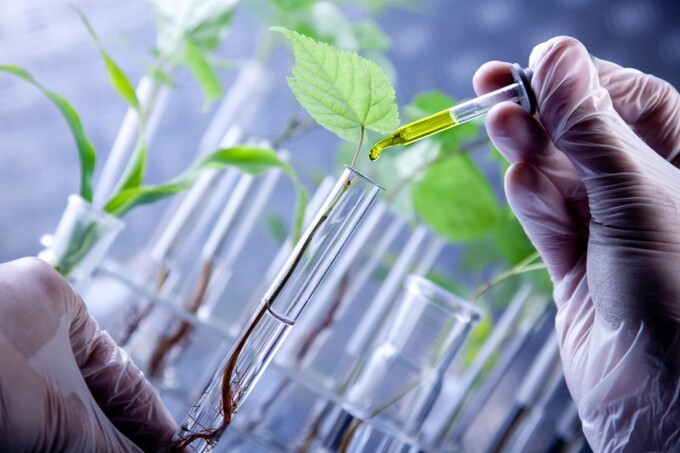
The scope for scientific and technological development in agriculture is still very large. Picture: tsp.
Accordingly, the commander of the agricultural sector stressed the need to organize a forum for companies, institutions and scientists to participate and make proposals on the development of bio-industry in agriculture.
At the meeting, a representative of the Ministry of Science and Technology said that so far the team of scientists in the biological industry has been increasingly trained and qualitatively improved. Since then, the representative of the Ministry of Science and Technology suggested that the Ministry of Agriculture and Rural Development improve the quality and equipment of the institutes. At the same time, conditions are created for companies to take shortcuts to keep up with the development trend of bio-industry in the world.
According to a representative of the Ministry of Finance, in addition to human resources, financial resources are also an important factor in the implementation of the program. Therefore, it is recommended that the Department of Agriculture and Rural Development consider adding resources to effectively implement the program.

